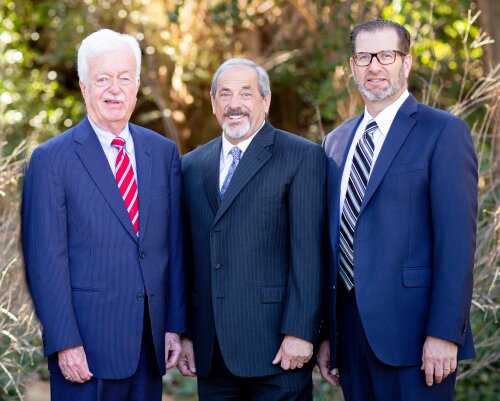Best Employer Lawyers in California
Share your needs with us, get contacted by law firms.
Free. Takes 2 min.
Or refine your search by selecting a city:
List of the best lawyers in California, United States
About Employer Law in California, United States
Employer law in California refers to the legal rights, responsibilities, and obligations that apply to employers when hiring, managing, and terminating employees. California is widely known for its robust and employee-friendly labor laws, which often go beyond federal standards. These regulations cover a wide range of issues such as wage and hour laws, workplace safety, discrimination and harassment prevention, and employee benefits. Both large and small employers must comply with these complex legal requirements to avoid lawsuits, fines, and harm to their business reputation.
Why You May Need a Lawyer
Employers might need legal assistance for several reasons. Common situations include:
- Drafting or reviewing employment contracts, employee handbooks, and company policies.
- Defending against employee claims of wrongful termination, discrimination, harassment, or retaliation.
- Navigating complex wage and hour disputes, including overtime calculations and meal and rest break requirements.
- Ensuring compliance with state-specific labor laws and adapting to frequent changes in regulations.
- Guidance during mass layoffs, reductions in force, or business restructurings.
- Representation during audits or investigations by agencies like the California Labor Commissioner or the Department of Fair Employment and Housing.
- Advice on workplace accommodations for disabilities or leaves of absence under federal and state laws.
Because California’s employment laws are highly detailed and can be confusing, experienced legal guidance can help employers avoid costly mistakes and resolve disputes efficiently.
Local Laws Overview
Several unique and important employment laws apply to California employers. Notable aspects include:
- At-Will Employment: Employment may be terminated at any time for any lawful reason unless there is a contract stating otherwise. However, numerous exceptions and limitations apply.
- Wage and Hour Laws: The California Labor Code establishes requirements for minimum wage, overtime pay, meal and rest breaks, and payment of wages upon termination. California’s minimum wage is typically higher than the federal minimum.
- Anti-Discrimination and Harassment: The Fair Employment and Housing Act (FEHA) prohibits discrimination and harassment based on protected characteristics such as race, gender, disability, age, sexual orientation, and more.
- Leaves of Absence: Employers must comply with various leave laws, including the California Family Rights Act (CFRA), Paid Family Leave, sick leave, and pregnancy disability leave.
- Workplace Safety: The California Division of Occupational Safety and Health (Cal/OSHA) enforces stringent workplace safety and health standards.
- Notice and Recordkeeping: Employers are required to post certain notices, provide pay stubs with detailed information, and retain records for specified periods.
- Local Ordinances: Some cities, like San Francisco and Los Angeles, have additional employment regulations such as higher minimum wages and unique scheduling laws.
Violations can result in significant penalties, making compliance essential for all employers in California.
Frequently Asked Questions
What is at-will employment in California?
At-will employment means either the employer or the employee may end the employment relationship at any time and for any lawful reason. However, terminations cannot be for an illegal or discriminatory reason.
What is the minimum wage in California?
The statewide minimum wage in California is higher than the federal standard and can change yearly based on inflation and legislation. Some cities and counties have even higher local minimum wages.
How do overtime rules work in California?
Employees are generally entitled to overtime pay after working eight hours in a day or 40 hours in a week. Overtime is paid at one and one-half times the regular rate of pay, with double time for certain longer shifts.
What counts as workplace discrimination under California law?
Discrimination occurs when an employer takes adverse action based on race, gender, age, religion, disability, sexual orientation, and other protected characteristics as outlined by FEHA.
Are employers required to provide meal and rest breaks?
California law requires employers to provide meal breaks and rest breaks based on the number of hours an employee works. Failing to do so can result in significant financial penalties.
Must employers accommodate employees with disabilities?
Yes, employers are required to provide reasonable accommodations for employees with disabilities unless doing so would create an undue hardship for the business.
What steps should an employer take if an employee files a complaint?
Employers should promptly investigate any complaints, document their findings, and take appropriate remedial action if necessary. Legal advice is often recommended to manage the process correctly.
Can an employer conduct background checks on job applicants?
Yes, but California restricts how and when employers can use criminal background checks during the hiring process. Employers must comply with the Fair Chance Act and other relevant laws.
What should employers know about employee classification?
Employers must correctly classify workers as employees or independent contractors. Misclassification can lead to significant legal liabilities and penalties under California law.
How can employers stay updated on changing employment laws?
Regularly reviewing guidance from government agencies, attending trainings, and consulting with knowledgeable employment law attorneys are the best ways to keep current and compliant.
Additional Resources
Here are valuable organizations and agencies that provide information, forms, regulations, and guidance for California employers:
- California Department of Industrial Relations (DIR)
- California Division of Labor Standards Enforcement (DLSE or Labor Commissioner’s Office)
- California Department of Fair Employment and Housing (DFEH)
- California Employment Development Department (EDD)
- Cal/OSHA (California Division of Occupational Safety and Health)
- Small Business Administration (SBA) California District Offices
- Local city or county business regulatory agencies
- California Chamber of Commerce
These resources offer up-to-date information on compliance, best practices, and new legal developments.
Next Steps
If you are an employer in California and are facing a legal challenge or have questions about compliance, consider the following steps:
- Document your problem, gather relevant records, and make a timeline of events.
- Consult reputable online resources and government agencies for preliminary information.
- Contact a qualified employment law attorney who understands California’s specific regulations.
- Prepare your questions in advance to make the most of your legal consultation.
- Follow your attorney’s advice carefully and keep records of any consultations or legal actions taken.
Having the right legal support can help you make informed decisions, prevent costly errors, and protect your business interests within California’s complex legal environment.
Lawzana helps you find the best lawyers and law firms in California through a curated and pre-screened list of qualified legal professionals. Our platform offers rankings and detailed profiles of attorneys and law firms, allowing you to compare based on practice areas, including Employer, experience, and client feedback.
Each profile includes a description of the firm's areas of practice, client reviews, team members and partners, year of establishment, spoken languages, office locations, contact information, social media presence, and any published articles or resources. Most firms on our platform speak English and are experienced in both local and international legal matters.
Get a quote from top-rated law firms in California, United States — quickly, securely, and without unnecessary hassle.
Disclaimer:
The information provided on this page is for general informational purposes only and does not constitute legal advice. While we strive to ensure the accuracy and relevance of the content, legal information may change over time, and interpretations of the law can vary. You should always consult with a qualified legal professional for advice specific to your situation.
We disclaim all liability for actions taken or not taken based on the content of this page. If you believe any information is incorrect or outdated, please contact us, and we will review and update it where appropriate.
Browse employer law firms by city in California
Refine your search by selecting a city.















